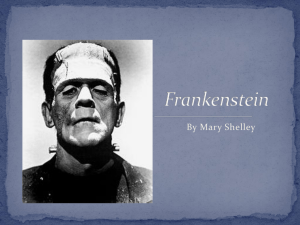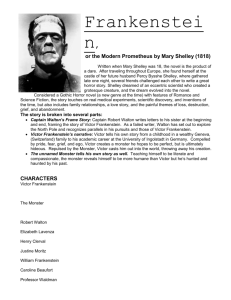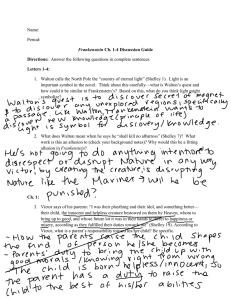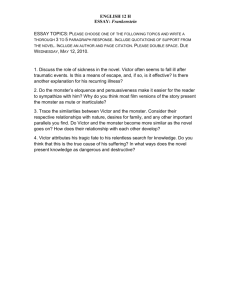ENGL&102 – English Composition II (Online & Hybrid)
advertisement
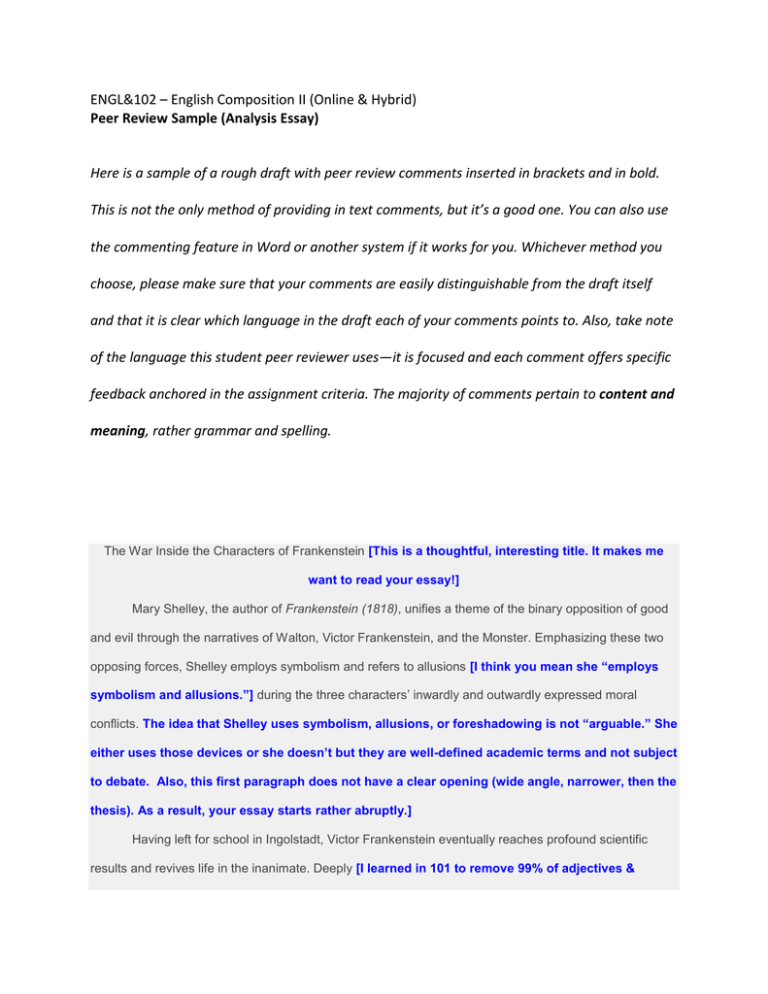
ENGL&102 – English Composition II (Online & Hybrid) Peer Review Sample (Analysis Essay) Here is a sample of a rough draft with peer review comments inserted in brackets and in bold. This is not the only method of providing in text comments, but it’s a good one. You can also use the commenting feature in Word or another system if it works for you. Whichever method you choose, please make sure that your comments are easily distinguishable from the draft itself and that it is clear which language in the draft each of your comments points to. Also, take note of the language this student peer reviewer uses—it is focused and each comment offers specific feedback anchored in the assignment criteria. The majority of comments pertain to content and meaning, rather grammar and spelling. The War Inside the Characters of Frankenstein [This is a thoughtful, interesting title. It makes me want to read your essay!] Mary Shelley, the author of Frankenstein (1818), unifies a theme of the binary opposition of good and evil through the narratives of Walton, Victor Frankenstein, and the Monster. Emphasizing these two opposing forces, Shelley employs symbolism and refers to allusions [I think you mean she “employs symbolism and allusions.”] during the three characters’ inwardly and outwardly expressed moral conflicts. The idea that Shelley uses symbolism, allusions, or foreshadowing is not “arguable.” She either uses those devices or she doesn’t but they are well-defined academic terms and not subject to debate. Also, this first paragraph does not have a clear opening (wide angle, narrower, then the thesis). As a result, your essay starts rather abruptly.] Having left for school in Ingolstadt, Victor Frankenstein eventually reaches profound scientific results and revives life in the inanimate. Deeply [I learned in 101 to remove 99% of adjectives & adverbs from my essay, which I think will help streamline your language.] regretting his creation, distressed Victor encounters an old friend—Henry Clerval. While Clerval helps him recover mentally and physically, Elizabeth writes of her concerns and mentions Justine Moritz, who has returned to live in Geneva due to the death of her mother.[Because this is your first mention of them, you have to tell your reader who Elizabeth and Justine are. Remember our hypothetical reader who hasn’t read the story. We need to establish all relevant context.] Victor plans to return to Geneva, but before leaving Ingolstadt he receives his father’s letter with news that William, Victor’s brother, was murdered. After Justine is falsely accused and executed, Victor falls into depression and escapes to Montanvert. In hope of finding solace, Victor wanders the summit when he is eventually is approached by the monster. Encountering the monster, Victor realizes his creation is intelligent and articulate. The monster speaks to Victor of his travels and experiences with some positive human interaction through Felix, Agatha, and Safie. [You’ve included some details in your summary that I think are unnecessary to your particular essay, like the names of all the deLaceys, Alphonse, and Montanvert.] When it reveals itself to Felix, Agatha, and Safie, the monster is driven away by their disgust and terror. When it stumbles across Victor’s brother William, the monster kills him for revenge because William is the son of Alphonse Frankenstein [To someone who hasn’t read the book, this makes it seem like the monster has a grudge against Victor’s father. This is another instance of needing to establish context for our hypothetical reader]. The monster points to the cause of his murderous rage, which is solely rooted in his loneliness. Under the demand that he create a female version of the monster, Victor insistently refuses but the monster convinces him to proceed [This summary seems to end at the beginning of Volume III. Will you include the rest of the novel?] The binary opposition of good and evil is a major theme, which is developed in conjunction with [“in conjunction with” and just “with” mean the same thing – fewer words is better.] three different narratives—the letters of Captain Walton, the story of Victor’s creation, and the series of events [“series of events” and just “events” mean the same thing.] that follow the Monster’s creation. In Letter Two, Captain Walton writes to his sister Margaret expressing of his loneliness—which he considers to be “a most severe evil” (Shelley 9). While examining his intellectual worth, Walton believes his being self-educated is “still a greater evil”, because he “read nothing but our uncle Thomas’s books of voyages” (Shelley 10). Differently raised from the scholarly ways of Victor Frankenstein, Walton expresses his utmost need for companionship to his sister. The incapability and intellectual inferiority that Walton believes of himself directly parallels with the beginning of Victor Frankenstein’s narrative—which he describes the feelings of powerlessness after the death of his mother. [I’m not seeing this parallel. The “evils” these two characters describe look different to me. Can you clarify how you see them paralleling each other?] When his mother Caroline dies from illness, Frankenstein considers death as “the most irreparable evil”, and “the reality of [this] evil” becomes more burdensome as time passes (Shelley 34). As a result, Victor develops an adamant desire to play God—following the egocentric, intellectual journey to bring life to the lifeless. Victor narrates about his scientific discoveries, but his newfound knowledge become his very demise and an enduring curse; ironically, his story parallels to Walton’s ignorance—but life as a voyager isn’t as bad as having the fruit of your labor literally kill a brother of family. However, the Monster that Victor spawns is not the typical terrifying brute of many science fiction novels, but rather a self-taught, self-educated, articulate humanoid. [Good assertion supported by concrete examples, but I think more explanation is needed as to how this point relates to your good/evil binary.] The Monster learns language and becomes well read while living a life of eavesdropping, in secrecy among other human beings. As the Monster grows happy and comfortable around humans, it decides to prepare to assimilate and introduce itself to the humans: I [endeavored] to crush these fears, and to fortify myself for the trial which in a few months I resolved to undergo; and sometimes I allowed my thoughts, unchecked by reason, to ramble in the fields of Paradise, and dared to fancy amiable and lovely creatures sympathizing with my feelings and cheering my gloom; their angelic countenances breathed smiles of consolation (Shelley 143). [You give examples of Shelley mentioning “evil,” but I don’t see a binary with “good” identified here. And what is your commentary on this binary?] It [I’m confused about why you sometimes refer to the monster as “he” and sometimes as “it.” I think, chiefly, that you should only use one or the other throughout, and secondarily, that since Shelley humanizes him, you should use “he.”] narrates of daydreaming such heavenly objects, which completely opposite to the horrific daydreams of its creator Victor Frankenstein, and has a positive outlook for the future. That, however, is inevitably crushed by the disgusted reaction of the humans when he reveals himself. This eventually leads the Monster into frustration and rage, which leads to it murdering Frankenstein’s younger brother William. While emphasizing the theme of two important opposing forces, Shelley employs symbolism, Biblical, and Classical allusions to relate to the moral conflicts of Walton, Victor Frankenstein, and the Monster. [This last sentence should be the first sentence of your next paragraph. It is a good assertion that you support nicely with examples and quotes in the next paragraph, and it’s really the start of that paragraph. Also, this is where you seem to be talking about what you proposed in the opening, but again, I don’t think there’s any opinionated thesis here that someone could argue with. You seem to be identifying literary devices that Shelley uses, and that is something we all agree on. I want to hear some of your *opinions* about what you think about this novel, not just facts about how it is written.] In the letters to his sister, after Walton rescues Victor, he writes about Victor’s “double existence”. Walton writes that “[Victor] may suffer from misery, and be overwhelmed by disappointments, yet when he has retired into himself, he will be like a celestial spirit that has a halo around him, within whose circle no grief or folly ventures” (Shelley 21). Walton’s observation symbolizes and foreshadows the emphasis of the opposing forces battling within Victor, and expresses the moral conflict during Victor’s scientific endeavors. In the beginning of Victor’s time at the university, he says the first two or three days were spent alone: But as the ensuing week commenced, I thought of the information, which M. Krempe had given me concerning the lectures. And although I could not consent to go and hear that little conceited fellow deliver sentences out of a pulpit, I recollected what he had said of M. Waldman, whom I had never seen, as he had hitherto been out of town” (Shelley 37). [It’s not clear to me how either of these quotes illustrate Frankenstein’s moral conflict about science. I do see the use of foreshadowing in the first quote but I think we disagree about what is being foreshadowed. I see it as foreshadowing his inevitable showdown with the monster, not of his own internal conflict.] When the monster Victor created reads the scientific paper work in his pocket, he exclaims “[h]ateful day when I received life!” , and compares his misery to Adam of Genesis (Shelley 142). [Nice use of paraphrase and quotation.] Furthermore supporting the binary opposition of good and evil, the monster implores [You have misused the word “implores.” You want the word “implies.” Also, I don’t think he does imply it. I think he states it outright.] that his fate is worse than Satan’s because “Satan had his companions, fellow devils” but he was “solitary and detested” (Shelley 142). The irony is that Victor intended on playing God—bringing new life to the inanimate, but ultimately fails and brings harm to his loved ones. By examining the binary opposition of good and evil, one can see the reoccurring theme that loneliness and being without anyone [“Loneliness” and “being without anyone” are the same thing – you don’t need to say them both] is the greatest evil. From the narratives of Walton, of Victor, and of Frankenstein, all of them speak of being alone, whether it is on their voyages across vast oceans, to toiling away in studies and research, or exiled from society, the outlaws and outcasts are always emphasized as victims of evil. All three of these men in the novel are defined as outlaws and outcasts by the rhetorical devices that are employed throughout the story. [I see this as a paragraph break. The stuff above seems like a start to the assignment criterion “why is this thread important to understanding the novel?” I think it would be great to develop this idea.] I think its very interesting to look at the main theme of Frankenstein in a modern context. When I think of Frankenstein, I think of the outcasts and outlaws on the news today. I think that some of the school shootings, massacres, and terrorist attacks in recent world news have probably something to do with humans shunning the victims that eventually become the murders and essentially exiling them from modern society even when they can help them and turn the course of events from tragedy. [Good job of putting the idea of loneliness leading to isolation leading to evil, into a modern perspective. I think you can expand on this. This is where you get to synthesize new ideas and I want to hear those!] Hello [name omitted], Thank you for sharing your essay with our group. You identify many examples of the elements you list in your opening (symbolism, allusions and foreshadowing) and you step into and out of quotations effectively, with proper citation formatting. I particularly like the way you (on several occasions) combine paraphrase and quotation in a single reference. You do that well. If I have identified your thesis statement correctly, I have a few reactions to it. First, it is not written in the two-sentence format (the first sentence being an overview of ideas and the second being the thesis statement itself). Second, it is not arguable. Third, I don’t think it is complex since it relies mostly on identification and definition of literary devices. While you do reference thesis statement language in your essay, I might suggest some additional depth to your discussion of “good” and “evil” rather than only pointing to instances where those words occur in the text. To the four criteria of the assignment: you have identified a thread; I don’t think you have told your reader how that thread helps us to understand the novel (I think you start to do this at the beginning of the last paragraph, but you don’t end up developing it); I don’t think you’ve said how Shelley’s revisions impact our understanding of the thread; you have applied the thread to modern context. I don’t see any Marilyn Butler quotes. Best of luck to you in your revisions! Sincerely, [Name omitted]

